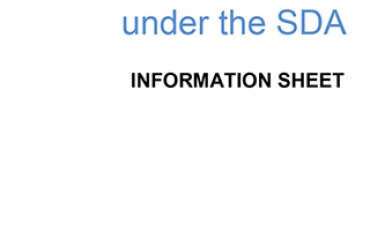Ensuring health and bodily integrity (2021)

Protecting the human rights of people born with variations in sex characteristics in the context of medical interventions
Summary and Factsheets
- Summary Report PDF (1.7 MB) | Word (158 MB)
- Fact Sheet 1: Guide to recommendations – PDF (82 KB) | Word (58 KB)
- Fact Sheet 2: Consent – PDF (75 KB) | Word (56 KB)
- Fact Sheet 3: Medical necessity – PDF (76 KB) | Word (56 KB)
- Fact Sheet 4: Clinical practice – PDF (169 KB ) | Word (53 KB)
- Fact Sheet 5: Independent panels – PDF (74 KB) | Word (55 KB)
- Fact Sheet 6: Authorisation of medical interventions – PDF (76 KB) | Word (54 KB)
- Fact Sheet: Responsible reporting guidelines – PDF (97 KB)
Report Launch
The President of Australian Human Rights Commission, Emeritus Professor Rosalind Croucher AM, released on 18 October 2021 the report Ensuring health and bodily integrity: towards a human rights approach for people born with variations in sex characteristics, the culmination of the Australian Human Rights Commission’s project about protecting the human rights of people born with variations in sex characteristics in the context of medical interventions.
Report Overview
The Australian Human Rights Commission’s report, Ensuring health and bodily integrity: towards a human rights approach for people born with variations in sex characteristics, seeks to provide a pathway forward to address a challenging set of human rights issues that can have significant personal impacts if not addressed. Past consideration of the issues in this Report has not resulted in the introduction of adequate protections, despite the significance of the issues.
On behalf of the Commission, I want to express my deep gratitude to those people directly affected by this issue who shared their experiences with us – people who have had interventions as children to vary their sex characteristics, and their parents. It can be both confronting and daunting to recount past experiences and I express my sincere thanks to you for participating. Your experiences and insights have helped inform the findings and recommendations in this Report.
The Commission also had the benefit of input from key clinicians, including paediatricians, endocrinologists and psychiatrists, as well as from legal, human rights and government agencies. Medical practitioners in particular were very open about the difficult decisions that they need to make, and considered they have always acted in the best interests of their patients. The Commission’s recommended actions in this Report will bolster this commitment, by improving the decision-making processes for medical practitioners, as well as for parents, and assist them in navigating these complex circumstances.
The Commission thanks everyone who participated in our consultation processes: people born with variation in sex characteristics, family members, peer-support and advocacy organisations, clinicians, legal and human rights entities, academia and government. This input has been crucial in identifying problems and solutions.
Ultimately, this report is about putting into place better protections for children who do not have the legal capacity to make life altering decisions for themselves.
Many of the most controversial and contested interventions have occurred when individuals were infants, or as children too young to be able to provide their own consent. Decisions about these procedures have often been made based on prevailing social attitudes and the available research base – both of which have changed in important ways over recent years.
In this Report, the Commission proposes better oversight and approval mechanisms, requirements for ensuring informed decision making for parents and children, a limiting of the circumstances in which an intervention may occur without the consent of the person affected, and stronger consequences where these requirements are not met.
Australia’s obligations under international human rights treaties have been central to the Commission’s approach in how to better protect individuals’ rights. Informed by these commitments, the Commission’s proposals for reform are underpinned by a human rights framework expressed in five fundamental human rights principles.
The recommendations in this Report propose a substantial change from the current framework. While this will no doubt have its challenges, the Commission considers that adopting this approach will best guarantee the human rights to health and bodily integrity of people born with variations in sex characteristics.
This project was led by the former Human Rights Commissioner, Edward Santow, and I thank him and his team for their efforts in conducting the project on the Commission’s behalf. I also appreciate the advice and input from Sex Discrimination Commissioner Kate Jenkins and National Children’s Commissioner Anne Hollonds and her team.
Emeritus Professor Rosalind Croucher AM
President, Australian Human Rights Commission
Project Background
What the project is about
The Australian Human Rights Commission conducted this project to considers how best to protect the human rights of people born with variations in sex characteristics — in the specific context of medical interventions with personal consent.
The aims of the project were to:
- identify key issues and obtain perspectives on current practice by consulting with various stakeholders, including individuals born with variations in sex characteristics, advocacy groups, medical professionals and representatives from federal, state and territory governments
- evaluate the current approaches taken to medical interventions in Australia and other jurisdictions using a human rights-based framework
- develop recommendations for a nationally consistent human-rights based approach to decision-making about medical interventions.
For this work, the Commission used the term ‘people born with variations in sex characteristics’ to refer to people born with bodies that do not align with medical norms for female or male bodies. This can include variations in sex chromosomes, hormones, reproductive organs and/or sexual anatomy. ‘Intersex’ is another term used to describe this population. Learn more about the background and terminology adopted in this project.
Consultation Paper
The Consultation Paper considered the human rights affected by medical interventions without personal consent, different international approaches on this issue, the current state of human rights law, and some of the main issues that arise in this context.
Consultation with people affected
As part of this project, the Commission consulted with people from all walks of life who are affected by this issue. Stakeholder consultation has allowed individuals born with variations in sex characteristics, parents and carers, and medical professionals the opportunity to contribute to the development of the final report.
The consultation phase of the project began in July 2018, with submissions closing on 30 September 2018. Consultation included interviews and written submissions. The consultation component of this project has been reviewed and approved by an external, independent Human Research Ethics Committee (HREC) at the University of Sydney.
For further information about the project, please email sogii@humanrights.gov.au



